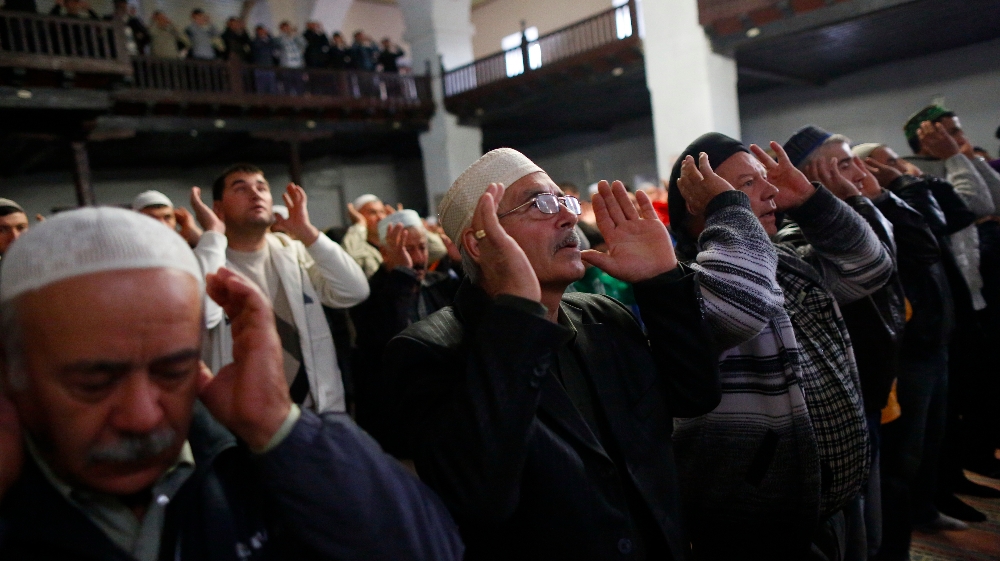Home » World News »
How Muslims are celebrating Eid al-Adha amid coronavirus
About 1.8 billion Muslims celebrate Eid amid a pandemic that has so far infected more than 16 million people.
Muslims worldwide will celebrate Eid al-Adha, also known as the Festival of Sacrifice, amid a coronavirus pandemic that has so far infected more than 16 million people worldwide.
Like the Islamic holiday Eid al-Fitr in May that followed the holy month of Ramadan, Muslims are being encouraged to take precautions and alter the way they observe as a result of COVID-19 between July 30 and August 4.
In normal circumstances, Eid day starts by gathering at a mosque in the morning to take part in prayers.
The Muslim Council of Britain (MCB) has published recommendations on its website promoting outdoor prayers and if not, for multiple staggered prayer times indoors.
Enough time should be arranged between congregations and khutbahs, or sermons, and they should be kept short, the MCB advised. It added Eid greetings should be given without hugging or shaking hands.
Much of Eid observances consist of getting together with family and friends and sharing meals, but the MCB advised it is best to keep numbers to a minimum and to meet outdoors.
Some mosques in Canada are following similar guidelines, with Toronto’s Jame Masjid encouraging Muslims to reserve a spot for prayer ahead of time on one of the eight different time slots on its SMART Jamaat app.
For those who are unable to reserve a time, the Bosnian Islamic Association (BIA) in Toronto said Muslims can still perform Eid prayers at home instead.
BIA advised Muslims to continue following the sunnah (practices of the Prophet Muhammad) by dressing in one’s best clothes and reciting takbirs (Islamic phrases in Arabic exalting God) as much as one can from Fajr (early morning prayer before sunrise) until the Eid prayer.
After having mosques closed for more than two months, including during Eid al-Fitr in May, Saudi Arabia announced that Eid prayers will take place inside mosques and not outside.
Its Ministry of Islamic Affairs recommended adhering to the usual precautionary measures such as keeping two metres (six feet) of social distancing and bringing one’s own prayer rug.
For your safety when you go to the mosque, please adhere to these Precautionary measures. pic.twitter.com/9osPi15hg8
Much of the world has implemented social distancing as a basic measure, but in the besieged Gaza Strip, Palestinians say they will be gathering with family and celebrating Eid as usual as there have been few cases.
According to Gaza’s health ministry, as of Monday there were only five people infected with the coronavirus who were all in quarantine at the hospital. Seventy people have so far recovered from coronavirus since the outbreak.
“So far we have zero cases of coronavirus in Gaza [outside of the hospital]. That’s why this won’t affect how we celebrate; it will be the same,” Karama Fadel, 31, an Arabic-language teacher from Gaza City, told Al Jazeera.
She added her siblings living in Turkey, Belgium and Morocco will not be able to celebrate as usual under coronavirus measures.
“Here in Gaza we can celebrate, but unfortunately our families outside of Gaza cannot celebrate like us and can’t be with us,” Fadel said.
Distributing meat to the poor
A major part of Eid al-Adha is the Qurbani (or Udhiya), which means sacrifice. Livestock – goats, sheep, cows or camels – are sacrificed reflecting on Prophet Ibrahim’s (Abraham for Christians and Jews) willingness to sacrifice his son Ismail (Ishmael) for the sake of God.
The meat is then donated to the poor as well as neighbours and family. Every Muslim who has the financial means should give his share to the poor.
Many donate money to their local mosque or organisation, who in turn buy the livestock and distribute the meat to millions of people in need worldwide. All livestock must be hygienically and ethically treated.
The MCB advises that if sharing Udhiya locally, to make contactless drop-offs.
Indonesia, which has the highest rate of coronavirus cases in Southeast Asia, issued a notice last month that prayers in congregation and the slaughter of sacrifical animals are allowed in areas at low risk of coronavirus transmission.
Other countries are also taking special precautions. In Hyderabad, India, a mufti issued a fatwa (legal opinion given by a qualified religious scholar) that Muslims can donate an equal amount of money to the poor instead of sacrificing an animal if they are unable to do so because of the pandemic.
The fatwa comes as some fear coronavirus may spread if people visit markets to buy livestock or if people visit others when distributing the meat.
Pakistani authorities have banned setting up small makeshift meat markets within cities and have prohibited the slaughter of animals in open spaces.
“I appeal to the citizens to avoid visiting cattle markets, and opt for online booking of sacrificial animals this year,” Zafar Mirza, Pakistan’s top health official, said on Sunday.
Asad Umar, Pakistan’s planning minister and head of a coronavirus task force, said in a tweet over the past few days “more than 500 illegal cattle markets had been shut” across Pakistan.
The World Health Organization published a list of guidelines this week including nominating one household in an area to perform the sacrifice, whose members adhere to physical distancing throughout the process.
The Stream
Celebrating Eid in conflict
Source: Read Full Article







